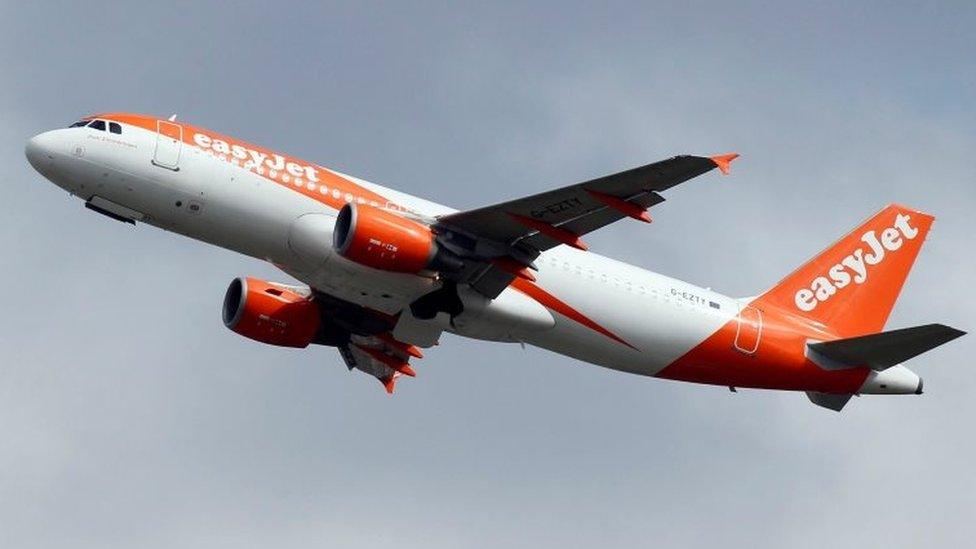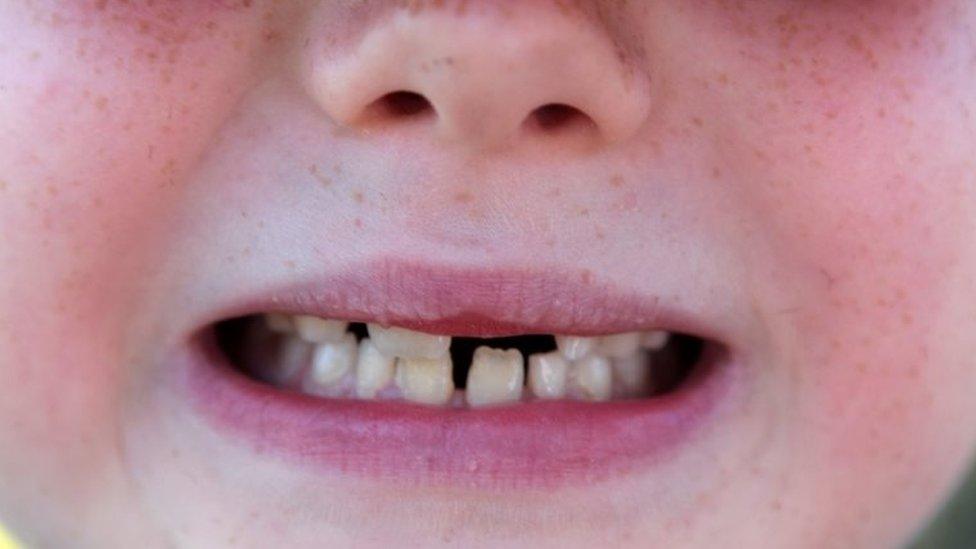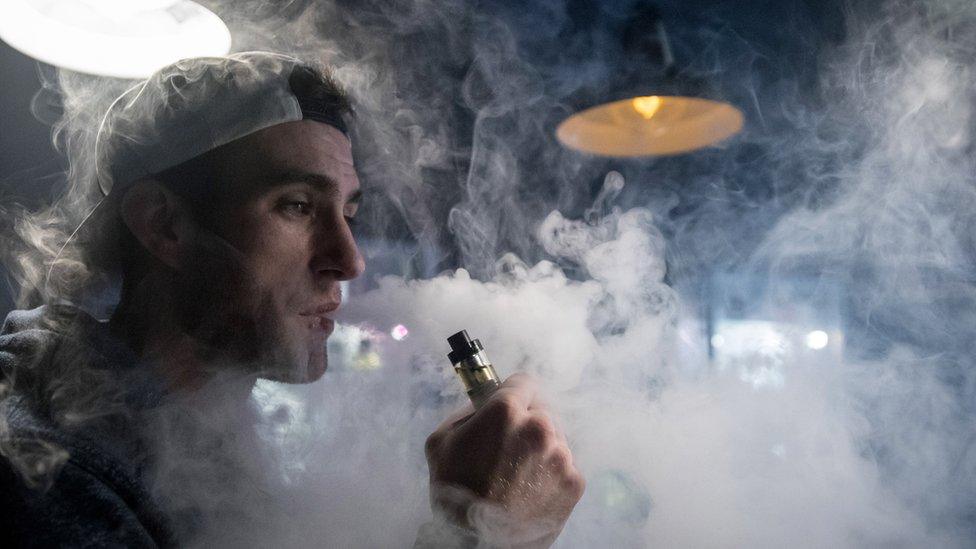Week ahead in Parliament
- Published

Will flights be grounded on Brexit Day?
With the EU (Withdrawal) Bill now on the Commons schedule - albeit not for a fortnight - there's a continuing sense of marking time in Westminster.
MPs are chewing on relatively uncontroversial legislation, with Opposition Day and Backbench debates dotting the agenda.
Of course Opposition Days have suddenly become rather less ritualistic, with Labour targeting subjects which put some rebel Tories or their DUP allies on the spot.
And the Conservative tactic of declining to vote on those issues has backfired somewhat, by allowing opposition MPs to cry foul. What subject will Labour choose this time?
In the Lords some technical Bills preparing the ground for Brexit are now in play - and some votes on the detail of the Data Protection Bill may provide the biggest legislative event of the week (see Monday, below).
And there will be plenty of important committee hearings - watch out for the ones on Housing and Energy, in particular.
Here's my rundown of next week's action.
Monday
The Commons week begins (2.30 pm) with Communities and Local Government Questions.
Watch out for the usual crop of post-weekend Urgent Questions and Ministerial Statements at 3.30pm.
The main debate is on the Second Reading of the Armed Forces (Flexible Working) Bill - which would allow part-time service for regular armed forces personnel.
This has already cleared the Lords. It is so uncontroversial that there is plenty of time for other issues to be added onto the agenda on Monday, if the demand is there.
In Westminster Hall (4.30 pm) the Petitions Committee has scheduled a debate on E-petition 168657, external, calling for a new voting system.
The petition argues that: "the vast majority wants PR. Our First Past The Post voting system makes Parliament unrepresentative. One party got 37% of the vote and 51% of seats, while 3 parties got 24% of the vote but share 1.5% of seats. FPTP violates the democratic principle of majority rule and causes problems like costly policy reversals."
The petition attracted 103,495 signatures.
MPs to debate changing vote system
On the Committee Corridor, my eye was caught by the Transport Committee hearing (4.45 pm) on Aviation and Brexit, with witnesses from Heathrow Airport, EasyJet, the Manchester Airports Group, and the International Airlines Group - likely issues include whether the flights will be grounded on Brexit Day and Heathrow expansion.
In the Lords (2.30 pm) questions to ministers range across the possibility of a flu epidemic this winter to access to Child and Adolescent Mental Health Services.
Then, there's some serious legislating, as peers turn to the detail of the Data Protection Bill and the first day of a marathon 7-day Committee stage.
The key event looks to be an attempt to insert Article 8 of the EU Charter of Fundamental Rights into the Bill to ensure protection of personal data.
This should be first up and, unusually for a Committee Stage amendment, where much of the action is about "probing" the government's intentions, there will be a vote.
The combined effect of amendments 1 and 4, from Labour's Lord Stevenson and the Lib Dem Baroness Ludford, would be to build in the EU's personal data regime.
Beyond that, the focus of the first day of debate will be on the sections dealing with General Processing and Scope, Definitions and the GDPR (General Data Protection Regulation), a more expansive definition which classifies a range of personal identifiers as personal data.
There are also amendments to provide specific protection for data on under-13s. DDCMS Minister Lord Ashton of Hyde leads for the government.
The dinner break interval will see a short debate on the recovery of Sierra Leone from the Ebola outbreak and the assistance offered in the recovery effort, led by the former Lord Speaker, Baroness Hayman.
Tuesday
MPs kick off (11.30 am) with Justice Questions and then, unless a Ministerial Statement or Urgent Question intrudes, the Labour former minister, Maria Eagle, has a Ten Minute Rule Bill which aims to ban tyres over 10-years-old from being used on public service vehicles like buses and coaches.
This is prompted by a crash in 2012, involving a coach taking people back to Liverpool from a music festival on the Isle of Wight. Two people were killed and the ensuing inquest found that the tyres on the coach were 19-years-old - older than one of the victims. The Tyred campaign, external, headed by Maria Eagle's constituent Frances Molloy, is pushing for this change.

Children's oral health is in the spotlight
The day's main event is the Report and Third Reading Stage of the Finance Bill, which picks up more controversial measures from March's Budget, which were dropped to allow a Finance Bill to be rushed through before the snap election.
Labour will follow the usual tactic of putting amendments down to require reviews and impact analyses of aspects of the proposals, like the effect of rules on overseas trusts and deemed domicile, or on disguised remuneration.
But they do propose a more substantive change - to remove the power for the Treasury to reduce the £30,000 threshold for taxation of termination payments, by regulations.
And there's an amendment from the Labour backbencher Stella Creasey calling for a review of the treatment of capital gains on commercial property disposed of by UK taxpayers with a foreign domicile, which has attracted a number of Conservative, as well as Labour, supporters.
My eye was caught by two Westminster Hall debates this morning; the first (9.30 am), led by Labour's Steve McCabe, is on child oral health. He wants to highlight that tooth extractions under anaesthetic are the leading category of emergency surgery for nine-year-olds, and that the funding system for dental health in England does not incentivise preventive work.
Then there are a couple of pre-Budget debates on alcohol-related issues. First the Orkney and Shetland MP and former Scottish Secretary, Alistair Carmichael, leads a debate on the future of the Scottish whisky industry.
He wants to highlight the impact of an increase in duty in the last Budget, and to point to the perils and opportunities for the industry, after Brexit.
Then, at 2.30pm, the Conservative Mike Wood leads a debate on the taxation of the beer and pubs sector - he will be calling for the Treasury to find ways to support it, and he will highlight the impact of current levels of beer duty and business rates.
My committee pick is the Environmental Audit Committee's occasionally eye-popping inquiry into packaging, which wraps up (geddit?) with evidence from the Environment, Food and Rural Affairs Minister Therese Coffey (10.20 am).
In the Lords, 2.30 pm Question Time includes the former Chief Inspector of Prisons Lord Ramsbotham on the review of probation contracts, a registration scheme for letting agents and removing Hamas from the list of terrorist organisations, in the light of its reported willingness to hold new elections and recognise the international frontiers of Israel.
Peers will then rubber stamp the Third Reading of the Air Travel Organisers' Licensing Bill, before turning to the second day of detailed Report Stage debate on the Financial Guidance and Claims Bill.
The government has already lost two votes on this Bill, including on adding a ban on cold calling for financial services, and has also promised to add an outright ban on cold calling for claims management companies when the Bill reaches the Commons.
Lib Dem Lord Sharkey could press his own amendment on the issue to a vote, if he is not happy with the offer from the minister.
And the same may be true of Amendment 41, a cross party attempt to impose some kind of duty of care on claims management companies. There are also a couple of "nudge" amendments, aimed at providing a last chance to give people information and guidance before they access their pension pots, could be pressed to a vote, if ministers fail to offer concessions.
There will also be a short debate on measures to improve the reliability of railway services.
Wednesday
The Commons opens (11.30 am) with Welsh questions, followed, at noon, by Prime Minister's Questions.
Once the PMQs hubbub has died down, the Conservative Richard Benyon will present a 10-minute rule bill on historic investigations into allegations against members of the armed forces. He aims to create a statute of limitations, to ensure there is a cut-off date for when serving or former armed service personnel can be accused of wrongdoing whilst serving on operations. The Bill was prompted by recent cases elderly ex-service personnel have been questioned under caution by the Police Northern Ireland on what, he says, often proved to be spurious allegations.
Then follows another Labour Opposition Day - no motion or motions have surfaced as I write.

MPs are set to debate vaping
There is a succession of interesting-looking debates in Westminster Hall, starting with the Conservative, Gareth Johnson, on Vaping (9.30 am). He wants to see further research on the risks, or otherwise, of vaping and to discuss whether vaping presents an opportunity to move people away from tobacco products.
Then the Conservative Anna Soubry stages a short debate (11 am) on Olympic sports and accepted GCSE PE activities. She's raising the case of a 16-year-old constituent, Kyle Ross Waddell, an elite speed skater who trains six days a week. He fears his GCSE in PE might be damaged because his sport is not listed in the syllabus as an approved activity and can't count towards his grade.
Next comes product safety and fire risk in residential premises (2.30 pm). Labour MP Jim Fitzpatrick will call on the government to beef up the recall system for electrical goods, where a potential safety hazard has been identified.
Finally, the Conservative Nigel Huddleston leads a debate on puppy smuggling (4.30 pm).
This follows up the findings of reports by the Dogs Trust, external. He will be arguing for changes to the law around the pet travel scheme, to clamp down on the illegal trade in puppies. This which sees animals being shipped over 1,000 miles from countries like Poland and Lithuania, with no opportunity to exercise or to toilet. The Dogs Trust describes the trade as "shocking" and cruel.
On the Committee corridor, the Communities and Local Government Committee will question the Housing Minister, Alok Sharma, (9.30am) on proposed changes to housing need assessment - the way the need for new homes is calculated for each local authority.
This is a key part of the government's strategy, set out in its Housing White Paper, to boost house-building by providing a standardised method of calculating housing need and requiring local councils to allocate the land to meet it. At the moment different councils use different systems.
Elsewhere, no less than four Cabinet ministers are before assorted committees - with the Business and Energy Secretary Greg Clark's appearance before his departmental committee (10am) to discuss the proposed energy price cap, the most politically-charged. Expect some probing on how committed the government is to that policy.
Boris Johnson is before the Foreign Affairs Committee at 2pm, Liam Fox at International Trade at 10.15, and Michael Gove is before Environmental Audit at 2pm.
In the Lords (2.30 pm) questions cover changing the rules on overseas development assistance; the number of 999 calls to the South East Coast Ambulance Service on 23 September to which no ambulance was sent and establishing an International Legal Task Force to gather evidence on sexual violence as a tactic of terrorism.
The day's main debate is on the Second Reading of the Sanctions and Anti-Money Laundering Bill, which transcribes the EU sanctions regime into UK law for the post-Brexit landscape. The Bill also covers some UN sanctions obligations as well as anti-money laundering conventions. One key issue will be how the UK acts alone on sanctions in a post-Brexit world.
Thursday
In the Commons MPs open (9.30 am) with Exiting the European Union Questions - an increasingly charged occasion. The weekly statement on forthcoming Commons debates follows.
The main debates are on two backbench motions, first on Calais and unaccompanied child refugees in Europe led by the Conservative Heidi Allen. The motion notes the UK's moral leadership in admitting 750 child refugees and rescuing them from intolerable conditions in the Calais camps - but adds that, post Brexit, provision must be made to ensure that unaccompanied children can continue to access the safe and legal means to reunite with family and relatives in EU as currently provided for under the EU Dublin III agreement.
Next there's a motion on sexual harassment and violence in schools from the chair of the Women and Equalities Committee, Maria Miller and Labour's Jess Phillips. They are concerned about the evidence of a rising number of sexual assaults in schools, and wants specific guidance about prevention to be put in place by the end of the year
In Westminster Hall, there's a general debate on HMRC closures led by the SNP's Stuart McDonald.
In the Lords (11 am) questions to ministers range across celebrations for the centenary of votes for women, moving residential properties from short-term to long-term housing rental and the enforcement of the Scrap Metal Dealers Act 2013.
The day's main debates are on subjects chosen by Conservative peers: firstly on the new opportunities and challenges for agriculture, fisheries and the rural economy in the UK; second, on the government's response to the Manifesto to Strengthen Families, external. The topical mini-debate in between them is on the Calais refugees, one year on. Last business of the day is a 90 minute debate on the programme for the Commonwealth Summit in London in 2018 and whether it will include a People's Forum and a Parliamentary Forum.
Friday
The Commons sits at 9.30am to consider Private Members' Bills - and the green benches may be rather more crowded than usual for these debates. I'm told at least 160 Labour MPs, including the Leader of the Opposition, Jeremy Corbyn, will be there, to try and ensure a Second Reading for the bill from the Labour front-bencher Jim McMahon to bring in votes at 16.
But before that, they have to push the Mental Health Units (Use of Force) Bill from the Labour MP, Steve Reed, through to its Second Reading.
This would outlaw disproportionate use of force against people with mental ill health - it is called Seni's law, external, after Seni Lewis from South London, who died aged 23 after being restrained face-down by 11 police officers in a mental health hospital.
Mr Reed says that, statistically, young black men are most at risk of death from inappropriate force, and that people on the autism spectrum or with a learning disability are at extra risk from restraint.
He is hopeful of government support for the measure but he may need the support of 100 MPs - the number needed to close a debate and head off any filibustering designed to eat into the time available to debate the next bill on the agenda (The chair will not normally allow a closure until there has been a substantial debate).
The idea of that would be to move on, in good time, to the Second Reading of Jim McMahon's Representation of the People (Young People's Enfranchisement and Education) Bill.
The last couple of Parliaments have seen repeated attempts to give the vote to 16 year-olds, either by private members bills in either House, or by amendments to bills.
Mr McMahon believes the latest moves in that direction in the Welsh National Assembly add weight to his case, but he can expect the government to oppose him, because the Conservative manifesto committed them to votes at 18. Again, he will need that magic number of 100 MPs to get the "closure motion" required to push the debate to a vote. It will be interesting to see whether the government will attempt a counter-mobilisation.
The third Bill on the agenda - which may get a few minutes at the end of the day - is Peter Bone's Voter Registration (No. 2) Bill, which would ban people being registered to vote at more than one address.
This would ease Conservative anxieties about double voting, particularly by students, who may be registered both at college and at the parental home.
The Lords are not sitting.